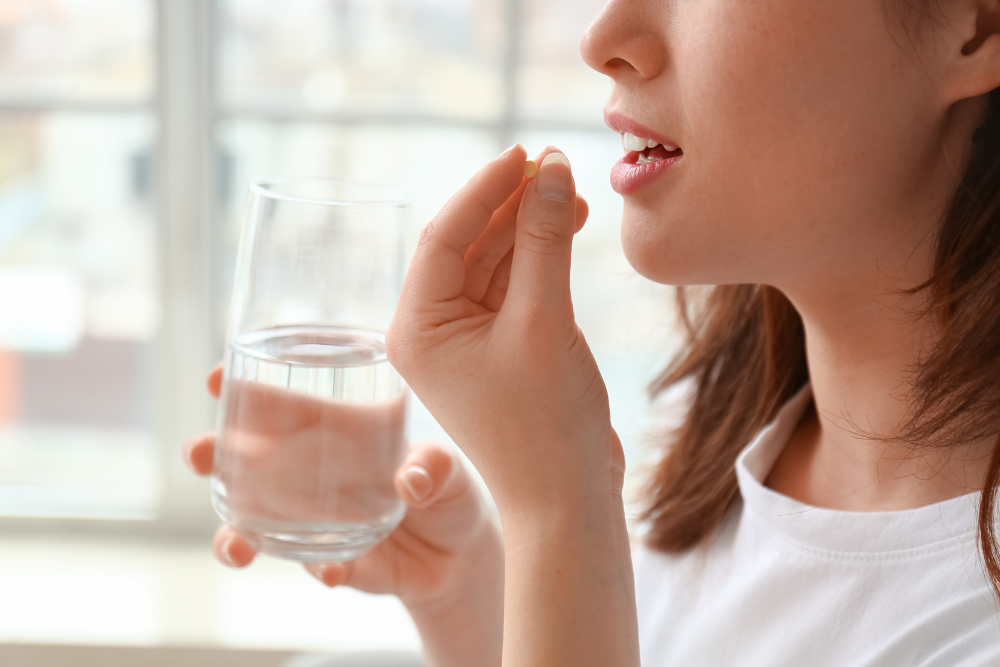Vaginal thrush is a common yeast infection caused by the Candida albicans fungus that can be uncomfortable to manage. But with the right approach, relief for this vaginal yeast infection is within reach. Whether you’re seeking instant relief or long-term solutions, we’ve got you covered with everything from prescription medications and over-the-counter products to natural remedies. Let’s find the perfect solution to treat thrush infection and get you back to feeling your usual self ASAP.
Natural Remedies
When it comes to treating thrush, many people prefer natural remedies for a gentler approach and minimal side effects. To treat the infection using natural remedies, try:
Probiotics
Harness the power of good bacteria to restore balance to your body’s microbiome. Probiotics, found in yoghurt, kefir, and supplements, can help crowd out the Candida albicans fungus responsible for thrush (1).
Coconut Oil
This versatile oil boasts antifungal properties that can help combat thrush. Apply coconut oil topically to affected areas for soothing relief and to inhibit fungal growth (2).
Tea Tree Oil
Known for its antifungal and antibacterial properties, tea tree oil can be diluted and applied topically to affected areas. Be sure to patch-test before use, as it may cause vaginal irritation in some individuals (3).
Garlic
Incorporate garlic into your diet or use garlic supplements to take advantage of its potent antifungal properties (4).
Remember, while natural remedies can offer relief for thrush, it’s essential to seek medical advice before starting any new treatments for yeast infections, especially if you’re pregnant, breastfeeding, or have underlying health conditions.

Over-the-Counter Products
When faced with the discomfort of thrush, over-the-counter (OTC) products can be a convenient and accessible solution.
Antifungal Creams and Ointments
These topical treatments are readily available at pharmacies and are formulated to target the Candida fungus responsible for thrush (5). Look for active ingredients and follow the product’s instructions for proper application.
Probiotic Supplements
While primarily known for their digestive health benefits, certain probiotic supplements may help restore the balance of bacteria and yeast in the body, potentially reducing the risk of thrush recurrence (1).
Oral Pain Relievers
Over-the-counter pain relievers such as ibuprofen can help relieve symptoms and discomfort associated with thrush, such as mouth or throat soreness (6).

Prescription Medications
When thrush symptoms persist or become severe, prescription medications may offer the targeted treatment needed to effectively combat the fungal infection.
Antifungal Medications
Prescription-strength antifungal medications are often the first line of defence against persistent or recurrent thrush. Antifungal treatment, available in various forms such as oral thrush tablets, creams, or intravenous injections, work by directly targeting the Candida fungus responsible for the infection.
Oral or Intravenous Antifungal Agents
In cases of severe or systemic thrush infections, healthcare providers may prescribe oral or intravenous antifungal medications to deliver potent doses directly into the bloodstream. These medications are typically reserved for severe cases or when thrush has spread beyond the mouth or genitals.
Corticosteroids
Inflammation and discomfort associated with thrush may be managed with prescription-strength corticosteroids. These medications help reduce inflammation and alleviate symptoms such as redness, swelling, and itching. Corticosteroids may be prescribed in the form of mouth rinses, topical creams, or oral tablets.
Immunotherapy
For people with a weakened immune system or recurrent thrush infections, immunotherapy may be considered to boost the body’s immune response and reduce the frequency of infections. Immunotherapy options may include medications that stimulate the immune system or targeted therapies aimed at addressing underlying immune deficiencies.
Combination Therapies
In some cases, healthcare providers may recommend combination therapies that utilise multiple medications or treatment modalities to effectively manage thrush symptoms and reduce the risk of recurrence. These treatment plans are tailored to the individual’s specific needs and may include a combination of antifungal agents, corticosteroids, and supportive therapies.
It’s essential to consult a healthcare professional before starting any prescription medication for thrush treatment. Your healthcare provider can assess your symptoms, medical history, and overall health to determine the most appropriate and effective treatment approach for your individual needs. symptoms.

Preventive Measures
While treating thrush is essential for immediate relief, taking preventive measures can help reduce the risk of future infections and maintain overall vaginal health (7).
Practise Good Hygiene
Maintaining proper hygiene in the genital area can help prevent thrush. Wash the external genital area with mild, fragrance-free soap and water daily, and avoid using harsh cleansers or douches that can disrupt the natural balance of bacteria and worsen thrush.
Wear Breathable Clothing
Tight-fitting clothing can trap moisture and heat, creating an environment conducive to fungal growth. Opt for breathable cotton underwear and loose-fitting clothing to promote air circulation and reduce moisture buildup.
Avoid Irritants
Certain products and habits can irritate the vaginal area and increase the risk of thrush. Avoid using scented or flavoured lubricants, perfumed feminine hygiene products, and harsh detergents on underwear. Additionally, limit the use of feminine products like tampons or pads with added fragrances or chemicals.
Practise Safe Sex
Engaging in unprotected sexual intercourse can introduce harmful bacteria and fungi into the vaginal area, consequently increasing the risk of thrush and other sexually transmitted infections (STIs). Conversely, consistent and correct usage of condoms can significantly reduce the risk of getting a sexually transmitted infection (STI) and uphold vaginal health.
Manage Underlying Conditions
Certain medical conditions and lifestyle factors can increase susceptibility to thrush, such as diabetes, HIV/AIDS, pregnancy, and prolonged use of antibiotics or corticosteroids. Work with your healthcare provider to manage underlying conditions effectively and minimise their impact on vaginal health.
Maintain a Balanced Diet
A healthy diet rich in nutrients can support immune function and maintain vaginal health. Incorporate probiotic-rich foods like yoghurt, kefir, and fermented vegetables into your diet to promote the growth of beneficial bacteria and discourage fungal overgrowth.
Manage Stress
Chronic stress can weaken the immune system and throw the body out of balance, making it more susceptible to infections like thrush. Practice stress-reduction techniques such as mindfulness, yoga, meditation or deep breathing exercises to support overall health and well-being.

Topical Treatments
Whether you’re dealing with oral thrush, vaginal thrush, or thrush in other areas of the body, topical medications offer convenience and effectiveness in managing discomfort. Here are some commonly used topical treatments for thrush:
Antifungal Creams and Ointments
Available over-the-counter or by prescription, thrush creams and ointments are applied directly to the affected skin or mucous membranes to combat fungal growth. These medications contain active ingredients that work by inhibiting the growth of Candida fungi.
Antifungal Gels or Pastes
Some topical antifungal medications come in the form of gels or pastes, which can be applied directly to the affected areas for localised relief.
Vaginal Antifungal Creams
For vaginal thrush, internal vaginal cream can be applied into the vagina to combat fungal infections and relieve symptoms such as itching, burning, and abnormal discharge.
Seeking Professional Help
When experiencing persistent or severe symptoms of thrush, seeking professional help is the key to accurate diagnosis and effective treatment. A healthcare provider can conduct a thorough evaluation, including a physical examination and possibly laboratory tests, to determine the underlying cause of your symptoms and recommend appropriate interventions. Whether it’s prescribing antifungal medications, guiding preventive measures, or addressing any underlying health conditions contributing to thrush, a healthcare professional can offer personalised support and guidance to help you find relief and regain control of your vaginal health.
Whether you prefer an internal cream or external cream, start your consultation to relieve vaginal itching now!
Sources:
Australasian College of Pharmacy. Feature – Probiotics and women’s health: bacterial vaginosis and vaginal candidiasis [internet]. 2022 [cited 31 July 2024]. Available from: https://www.acp.edu.au/education/journal/vol-1-iss-2/probiotics-womens-health/
National Library of Medicine. In vitro antimicrobial properties of coconut oil on Candida species in Ibadan, Nigeria [internet]. 2007 [cited 31 July 2024]. Available from: https://pubmed.ncbi.nlm.nih.gov/17651080/
International Journal of Molecular Sciences. The Influence of Tea Tree Oil on Antifungal Activity and Pharmaceutical Characteristics of Pluronic® F-127 Gel Formulations with Ketoconazole [internet]. 2021 [cited 31 July 2024]. Available from: https://www.mdpi.com/1422-0067/22/21/11326
National Library of Medicine. In vitro antifungal activities of Allium cepa, Allium sativum and ketoconazole against some pathogenic yeasts and dermatophytes [internet]. 2006 [cited 31 July 2024]. Available from: https://pubmed.ncbi.nlm.nih.gov/16690223/
National Library of Medicine. Efficacy of antifungal drugs in the treatment of vulvovaginal candidiasis: a Bayesian network meta-analysis [internet]. 2018 [cited 31 July 2024]. Available from: https://www.ncbi.nlm.nih.gov/pmc/articles/PMC6203166/
National Library of Medicine. Antifungal activity of ibuprofen alone and in combination with fluconazole against Candida species [internet]. 2000 [cited 31 July 2024]. Available from: https://pubmed.ncbi.nlm.nih.gov/10966233/
Better Health. Vaginal Thrush [internet]. 2024 [cited 31 July 2024]. Available from: https://www.betterhealth.vic.gov.au/health/conditionsandtreatments/vaginal-thrush





